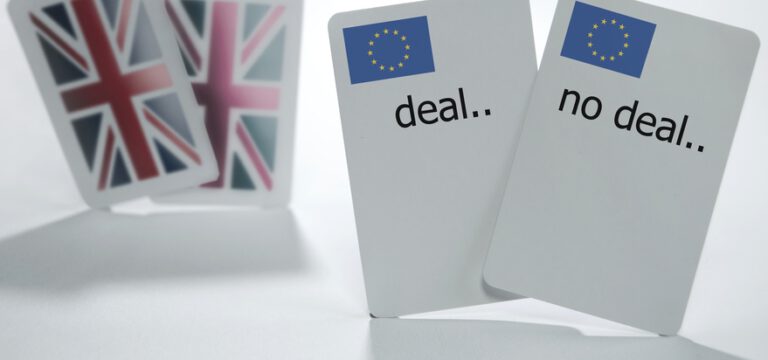The 12th of March 2019 will be remembered as a turnaround in British politics.
The British Prime Minister Theresa May again failed to convince her own Conservative Party of the merits of her Brexit Deal which she has negotiated again and again over more than two painful years. Despite tremendous pressures exerted by the Whip, too many Tories refused to follow Mrs. May`s credo, that her deal was the only one available. It was a bold and honourable move that the British Advocate General Mr. Geoffrey Cox did not mislead the House of Commons on the significance of the latest changes to the Brexit Deal. Where do we go from here?
To the relief of the British business community, on 13th March there was no majority in Parliament for a Brexit without a deal. In such times of wide-spread cluelessness, UK politicians were, for once, able to assume national and cross-party responsibility by ruling out Brexit without a deal.
Whether desirable or to be bedeviled by some, the only option left for the UK Government is to buy time from the European Member States and to postpone the Brexit date of 29th March. The British Government is quite rightly optimistic that the European Member States represented by the European Council of Ministers will grant such extra time as will be necessary whatever its justification may be. There will no doubt be important debates in Parliament about the length of extra time needed. The nature of the request will indicate whether the UK Government and/or Parliament are willing to fundamentally reconsider the whole notion of leaving the European Union or whether they are still toying with the risk of a Brexit without a deal. One, two or three months of extra time will not allow for a genuine debate and a change of perception. The risk of a Brexit without a deal will hang like a Damocles sword over the head of the Prime Minister. The longer the period of extension of Article 50 of the Brussels Convention the more visible the financial and political price for Brexit will become. Companies will leave Britain. Britain’s say in European affairs will decline rapidly. Young voters in Britain will wish to vote again and start demonstrating. Recent opinion polls show a definite majority for the UK to remain in the EU.
Now is the time and moment to seriously reflect what Great Britain as a nation really wants to achieve in the coming 20 to 30 years. Does it really wish to create a future for the majority of pensioners, mythically praising the glorious past, or will it be open to listen to its younger, creative and mobile middle class, whose financial future is seriously at stake? Without a doubt, the future relationship to the European continent will primarily affect younger people who – willingly or unwillingly – have had no vote in the Brexit Referendum, so far. Their rather naïve absence from the polling stations in the Brexit Referendum is no legitimate reason for politicians not to give them a second chance of expressing their opinion. UK’s decision to leave the European Union is far too fundamental as to rely on the naivety, innocence and wide spread ignorance of young men and women at the time of the Referendum.
Furthermore, the whole of the British public, whether living in rural or urban areas, whether being old or young has now been made aware of the true consequences of Brexit. Lies would have short legs. Greater transparency is probably the only fruitful outcome of two years of agonizing negotiations. It dawns on young people that they made a grave error in abstaining from voting.
With the wisdom of today’s knowledge and experience, some questions need to be repeated and deserve – at long last – genuine answers.
Is the European Commission really to blame for the gradual decline of living standards suffered by the British middle class?
Is the European continent to be blamed for the economic split between urban life as we see it especially in London and the life in the country side?
Is the European Court of Justice the prime cause of an ailing National Health Service and of the Britain’s frail national infrastructure such as roads, houses, railways and water?
Is the European Union really to be made responsible for a gradual decline in British global importance?
Or are there other reasons for the United Kingdom to have lost its sense of direction and unity?
Assuming that the European Union is to be blamed for all these alleged deficiencies in the UK, why have these phenomena not emerged on the same scale in Germany, the Netherlands, Poland, Finland, France and Italy? Is it not fair to say that most economic and social defects of the British society are evidently the result of errors of political and economic judgement at home? Was it really necessary to ax the manufacturing industry on such scale under the Thatcher era? Was it a wise decision to rely on financial services in London to such extent that half of the British economy depends on its well-being? Was it necessary to allow London to grow out of all dimensions while the country as whole was – by neglect – falling behind? Was the underfunding of the National Health Service dictated by the European Commission? Was social housing in Britain influenced by the European Union?
One may blame the President of a golf club for the muddle in the club house. It is, however, less convincing to blame him for the mess created in the home of one club member.
The answers to all these problems, which trouble the ordinary people in the street on a daily basis, should have been given in Number 10 Downing Street and its political elite. Would it not be worth the experiment, to relocate the Prime Minister’s office to Leeds or Glasgow – say for a period of ten years? Would this not change the perception amongst the political elite on the importance of the country outside London?
Admittedly, the release of national powers to a greater entity such as the European Union is a painful process, not least to those countries which enjoyed political independence for so long.
The UK can truly be proud of its legal system. And yet, its law has constantly been interfered with by the European Commission and the European Court of Justice. However, so has been the law of many other Member States with equal pride in their legal system.
The UK can be proud of its Westminster democracy which has greatly helped the country survive many a crisis in the past. And yet, the European Parliament is visibly gaining in importance at the expense of the national legislator. However, other European democracies complain, too.
The Government rightly enjoys the power to spend the people’s tax money usually in the best interest of the country. And yet, each Member State complains that it must make significant contributions to a European budget, which is supposed to be spent on useful, supra-national, European projects. The benefit for each Member State is often invisible. Undoubtedly, the monies spent in Brussels at times conflict with the goals of genuine European policies and could be more wisely spent nationally or locally. It is indeed questionable whether a huge amount of European monies is sensibly poured into the agricultural sector year by year. The contribution of agriculture to European unity is rather limited. These monies going to big farmers are sorely missed in budgets for cross-cultural exchange programs, improving living standards across Europe, creating a better cultural understanding through providing language tuition, and strengthening Europe’s infrastructure, but above all for promoting research and development in supra-national areas such as climate change, digitalization and security of European borders, all of which can no longer be mastered by any individual European country.
As is often neglected, such constant, and often tedious debates in Brussels and Strasbourg on what needs to be dealt with on a European wide level, and what can easily be handled nationally or even locally, are of utmost political importance for keeping Europe alive, united and peaceful. It is a constant reminder that Europe is based on the principle of debate, and a willingness to settle by way of compromise agreements. A speechless Europe becomes more vulnerable than a Europe of fruitless debates. If the United Kingdom ultimately wishes to abandon its seat in Europe and be no longer part of the European Debating Club it will have to find a new rhetoric role to be heard from outside. The British Empire was lost a century ago and does no longer form such base. So it has to find a modern and solid base of some different material. It is time that the Monarch gives prudent guidance in order to lead the country into a modern and united future.
Now is the time to reflect.
Bertrand Prell







